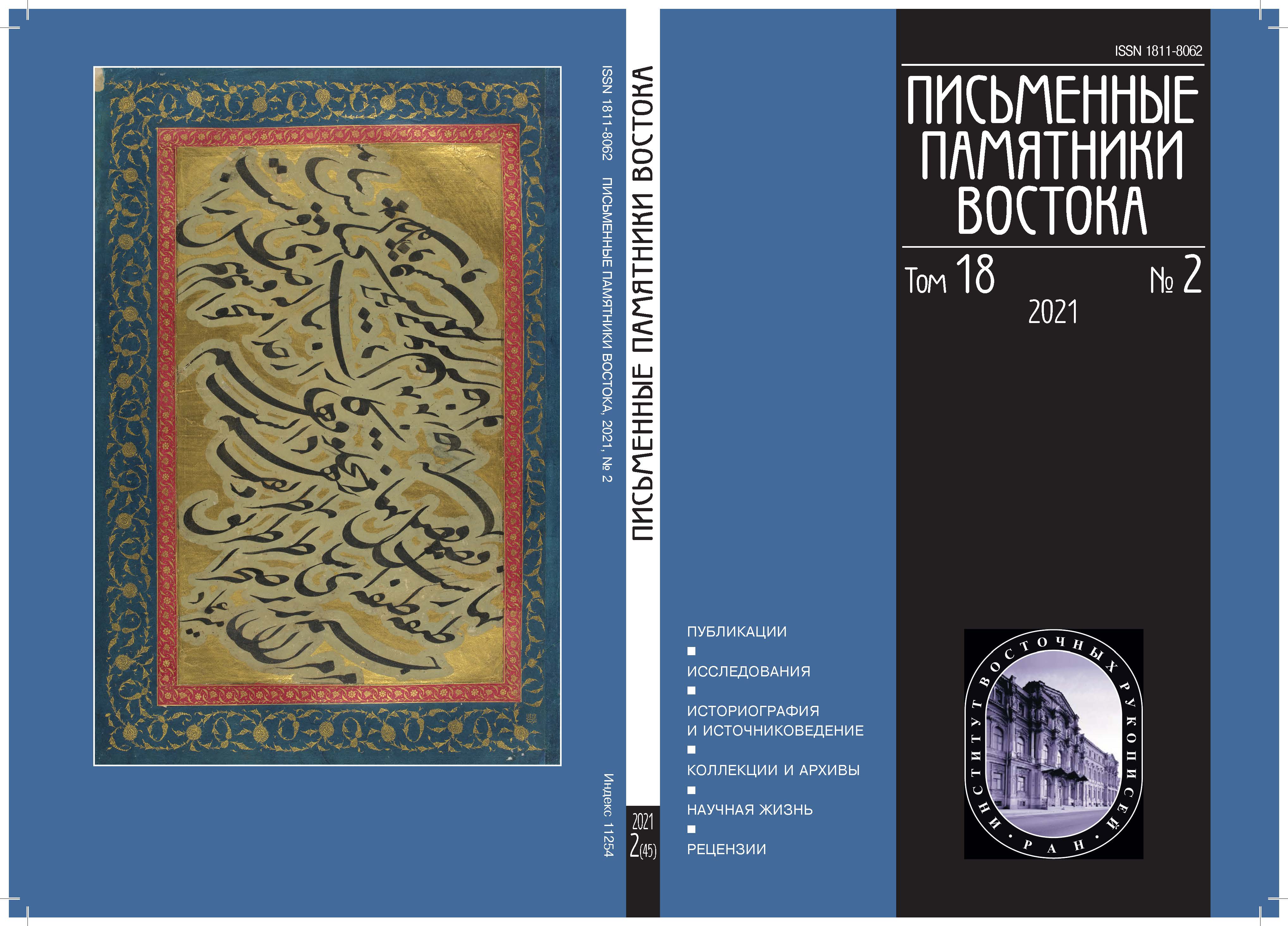Понятие сознания-сокровищницы в «Ланкаватара-сутре»
- Авторы: Бурмистров С.Л.1
-
Учреждения:
- Институт восточных рукописей РАН
- Выпуск: Том 18, № 2 (2021)
- Страницы: 36-50
- Раздел: Исследования
- Статья опубликована: 26.07.2021
- URL: https://journals.eco-vector.com/1811-8062/article/view/72173
- DOI: https://doi.org/10.17816/WMO72173
- ID: 72173
Цитировать
Полный текст
Аннотация
Понятие сознания-сокровищницы впервые появляется в «Ланкаватара-сутре», начало формирования которой относится к II–III вв., что позволяет говорить о возникновении этого понятия — одного из базовых в учении школы йогачара — задолго до появления этой школы, а возможно — и до появления исторически первой школы махаяны — мадхьямаки. Сознание-сокровищница служит базисом для семи эмпирических сознаний, обозначаемых общим термином pravṛtti-vijñāna «разворачивающееся сознание». Достижение просветления означает прекращение деятельности последнего, тогда как сознание-сокровищница сохраняется, освобожденное от реальных и потенциальных аффектов и кармически обусловленных диспозиций. Учение о сознании-сокровищнице связывается в сутре с учением о трех природах, из чего видно, что основные понятия учения йогачары представлены в сутре полностью. Причинами возникновения разворачивающегося сознания являются: непонимание истинной природы объектов сознания; аффективная привязанность к сансарическому миру; собственная сущность сознания — различение субъекта и объектов; и влечения к формам, порождающие и поддерживающие сансару.
Об авторах
Сергей Леонидович Бурмистров
Институт восточных рукописей РАН
Автор, ответственный за переписку.
Email: SLBurmistrov@yandex.ru
ORCID iD: 0000-0002-5455-9788
http://www.orientalstudies.ru/eng/index.php?option=com_personalities&Itemid=74&person=671
доктор философских наук, ведущий научный сотрудник Отдела Центральной и Южной Азии
Россия, 191186, Санкт-Петербург, Дворцовая набережнаяСписок литературы
- Бибуков 2018 — Бибуков А.Г. «Ланкаватара-сутра». Переводы, издания, история шрифта // Инновационные технологии в науке и образовании: Сборник статей VII Международной научно-практической конференции. Пенза: Наука и просвещение, 2018. С. 193–195.
- Васубандху 1998 — Васубандху. Энциклопедия Абхидхармы (Абхидхармакоша). Т. 1: Раздел I: Учение о классах элементов; Раздел II: Учение о факторах доминирования в психике / Изд. подгот. Е.П. Островская, В.И. Рудой. М.: Ладомир, 1998.
- Васубандху 2001 — Васубандху. Энциклопедия Абхидхармы (Абхидхармакоша). Т. 2: Раздел III: Учение о мире; Раздел IV: Учение о карме / Изд. подгот. Е.П. Островская, В.И. Рудой. М.: Ладомир, 2001.
- Васубандху 2006 — Васубандху. Энциклопедия буддийской канонической философии (Абхидхармакоша) / Пер. с санскр., сост., коммент. и исслед. Е.П. Островской и В.И. Рудого. СПб.: Издательство С.-Петербургского университета, 2006.
- Дюмулен 1994 — Дюмулен Г. История дзэн-буддизма: Индия и Китай. СПб.: Орис, 1994.
- Кобзев 2011 — Кобзев А.И. «Ланкаватара-сутра» // Философия буддизма: Энциклопедия / Отв. ред. М.Т. Степанянц. М.: Восточная литература, 2011. С. 395–398.
- Лама Анагарика Говинда 1993 — Лама Анагарика Говинда. Психология раннего буддизма. Основы тибетского мистицизма. СПб.: Андреев и сыновья, 1993.
- Орлов 2005 — Орлов А. Читтаматра: миф и реальность. М.: Шечен, 2005.
- Островская 2019 — Островская Е.П. Базовые черты буддийской личности // Письменные памятники Востока. 2019. Т. 16. № 3 (вып. 38). С. 59–69.
- Рудой 1994 — Рудой В.И. Четыре системы буддийской классической религиозно-философской мысли // Буддийский взгляд на мир / Под ред. Е.П. Островской и В.И. Рудого. СПб: Андреев и сыновья, 1994. С. 47–68.
- Рудой 1998 — Рудой В.И. Введение в буддийскую философию // Васубандху. Энциклопедия Абхидхармы (Абхидхармакоша). Т. 1: Раздел I: Учение о классах элементов; Раздел II: Учение о факторах доминирования в психике / Изд. подгот. Е.П. Островская, В.И. Рудой. М.: Ладомир, 1998. С. 11–113.
- Торчинов 1991 — Торчинов Е.А. О психологических аспектах учения праджняпарамиты (на примере «Ваджраччхедика-праджняпарамита-сутры») // Психологические аспекты буддизма / Под ред. Н.В. Абаева. 2-е изд. Новосибирск: Наука, 1991. С. 104–125.
- Торчинов 2000 — Торчинов Е.А. Введение в буддологию: Курс лекций. СПб.: Санкт-Петербургское философское общество, 2000.
- Чаттерджи 2004 — Чаттерджи А.К. Идеализм йогачары / Пер. с англ. Д. Устьянцева. М.: Шечен, 2004.
- Шохин 1994 — Шохин В.К. Брахманистская философия. М.: Восточная литература, 1994.
- Шохин 2004 — Шохин В.К. Школы индийской философии: Период формирования (IV в. до н.э. — II в. н.э.). М.: Восточная литература, 2004.
- Abhidharmasamuccayabhāṣyam 1976 — Abhidharmasamuccayabhāṣyam. Ed. by N. Tatia. Patna: Kāśīprasāda Jāyasavāla Anuśīlana Saṃsthā, 1976.
- Anacker 1970 — Anacker S. Vasubandhu: Three Aspects. A Study of a Buddhist Philosopher. PhD thesis. University of Wisconsin, 1970.
- Asanga 1950 — Asanga. Abhidharma-samuccaya. Critically edited and studied by Pralhad Pradhan. Santiniketan: Visva-Bharati, 1950.
- Asanga 2003 — Asanga. The Summary of the Great Vehicle. Transl. by J.P. Keenan. Berkeley: Numata Center for Buddhist Translation and Research, 2003.
- Dasgupta 1952 — Dasgupta S.N. A History of Indian Philosophy. Vol. 3. Cambridge: Cambridge University Press, 1952.
- Kalupahana 2008 — Kalupahana D.J. A Sourcebook on Later Buddhist Philosophy. Dehiwala: Buddhist Cultural Centre, 2008.
- Kochumuttom 1989 — Kochumuttom Th.A. A Buddhist Doctrine of Experience. Delhi: Motilal Banarsidass, 1989.
- Nāgārjuna 1960 — Nāgārjuna. Madhyamakaśāstra with the Commentary “Prasannapadā” by Candrakīrti. Ed. by P.L. Vaidya. Darbhanga: The Mithila Institute of Post-Graduate Studies and Research in Sanskrit Learning, 1960.
- Saddharmalankavatarasutram 1963 — Saddharmalankavatarasutram. Ed. by P.L. Vaidya. Darbhanga: The Mithila Institute of Post-Graduate Studies and Research in Sanskrit Learning, 1963.
- Schmithausen 1987 — Schmithausen L. Ālayavijñāna: On the Origin and the Early Development of a Central Conception of Yogācāra Philosophy. 2 vols. Tokyo: The International Institute of Buddhist Studies, 1987.
- Schmithausen 2014 — Schmithausen L. The Genesis of Yogācāra-Vijñānavāda: Responses and Reflections. Tokyo: The International Institute for Buddhist Studies, 2014.
- Suzuki 1932 — Suzuki D.T. Introduction // The Lankavatara Sutra: A Mahayana Text. Transl. by D.T. Suzuki. L.: George Routledge and Sons, 1932. Рр. xi–xlix.
- The Scripture on the Explication of Underlying Meaning 2000 — The Scripture on the Explication of Underlying Meaning. Transl. by J.P. Keenan. Berkeley: Numata Center for Buddhist Translation and Research, 2000.
- Vasubandhu 1967 — Vasubandhu. Abhidharmakośabhāṣya of Vasubandhu. Ed. by P. Pradhan. Patna: K. P. Jayaswal Research Centre, 1967.
- Vasubandhu 2005 — Vasubandhu. The Teaching of the Three Own-Beings (Tri-Svabhāva-Nirdeśa) // Anacker S. Seven Works of Vasubandhu, the Buddhist Psychological Doctor. Delhi: Motilal Banarsidass. 2005. Р. 278–297 (translation), 464–466 (Sanskrit text).
Дополнительные файлы








